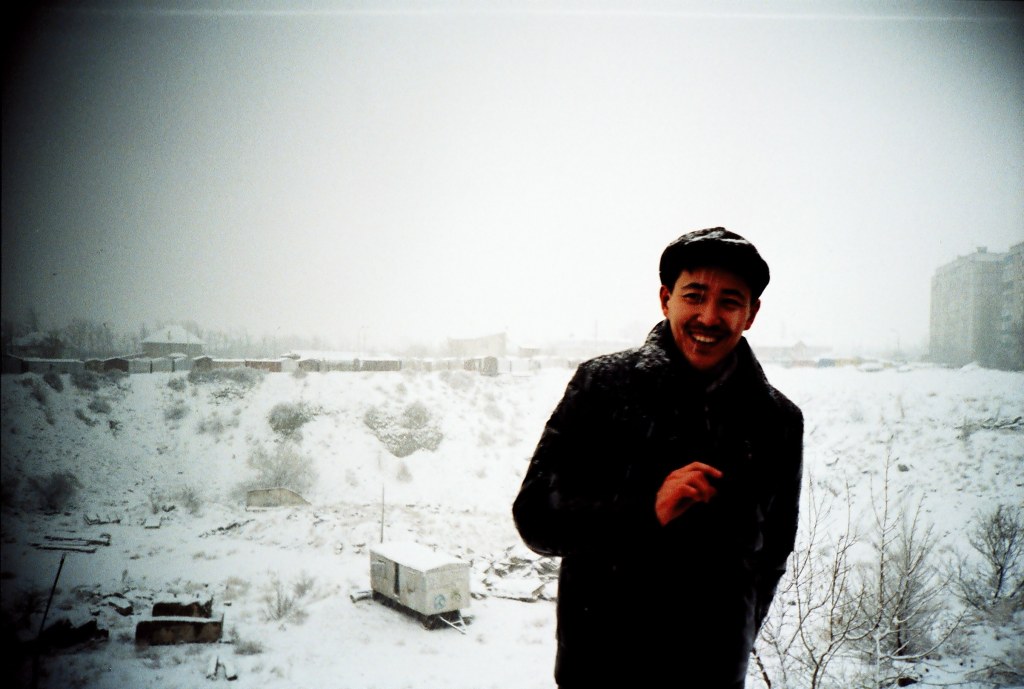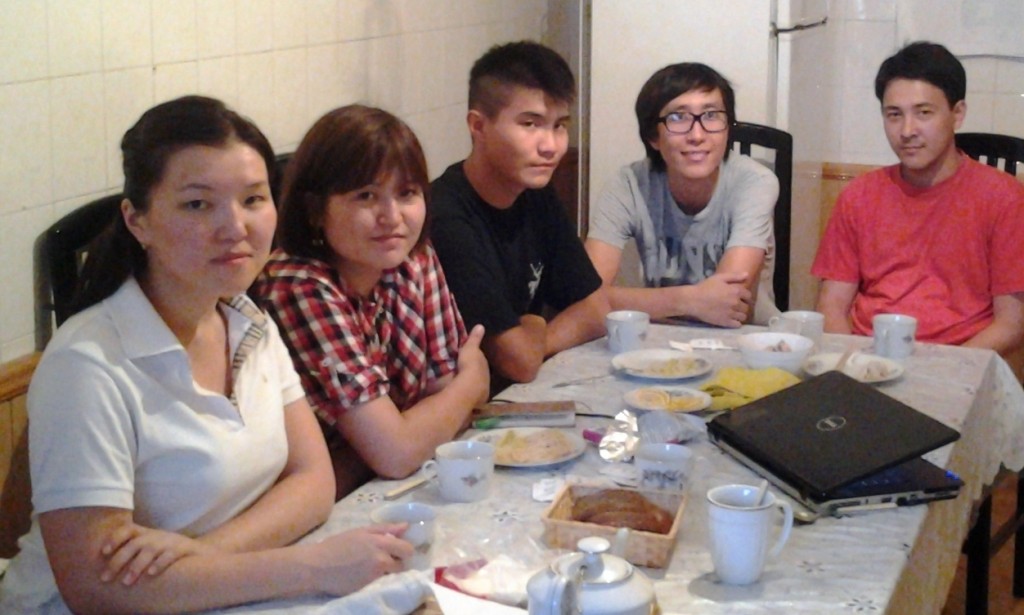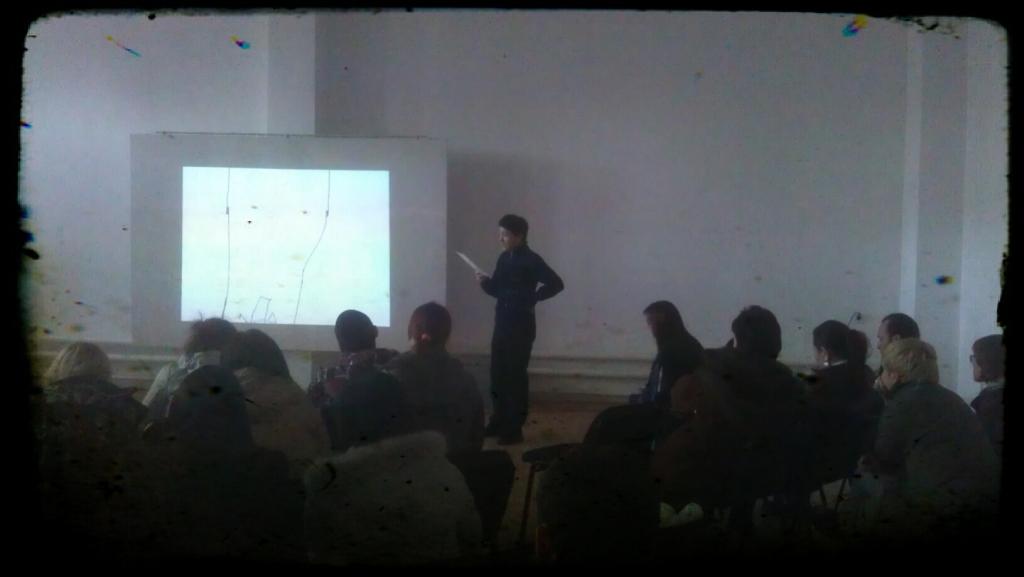Although artists anywhere in the world tend to be at least a little unconventional, the Kyrgyzstani art group ‘705’ is all about breaking the country's cherished social norms and conventions. Describing [ru] itself as a ‘nomadic theater’, the group experiments with multiple arts, including theater, hand-drawn animation, radio drama, and drawing. The role and status of women in a patriarchal society and the problem of authority are two big themes addressed by ‘705’.
In this interview, the art group's head Marat Raiymkulov talks to Global Voices Online about the group.

Marat Raiymkulov, the head of the art group ‘705’. Personal photo, used with permission.
Global Voices Online: ‘705’ describes itself as a ‘nomadic theater’ created to ‘promote the idea of an individual as a theater’. What does this mean?
Марат Райымкулов: Группа «705» появилась в 2005 году… Поскольку у нас не было театральной плошадки, то мы ставили на улице, на окраинах города, в подвалах. В этом смысле мы не привязывались к определенному месту, но всегда находились в поиске все новых и новых мест. Это стало некоторой традицией нашей группы…
За все время существования состав группы многократно менялся… Театр мы воспринимаем как средство выражения. В таком случае, каждый участник не часть театра, а театр часть жизни участника. Если участник нашей группы сумел вынести свое понимание театра, то он словно отпочковывается и продолжает жить и развиваться, возможно развивая театр как средство выражения. В этом смысле мы пытаемся придерживаться открытости – находясь в постоянном изменении состава, способа выражении и работы. В этом смысле мы рассматриваем себя как номадический театр.
Marat Raiymkulov: The group ‘705’ was created in 2005… Because we did not have a theater venue, we had to perform in the street, on the city's outskirts, in basements. In this sense, we were not tied to a particular venue but have constantly been looking for new venues. This has become our group's tradition…
The composition of the group has changed many times… We view theater as a mode of expression. In this sense, it is not that each member of the group is part of a theater, but that theater is part of each member's life. If a member of our group develops her or his own understanding of theater, then the member [separates from the group] and continues to live and grow, perhaps further developing theater as a mode of expression. Thus, we are trying to remain open-minded, constantly changing the group's composition, modes of expression, and work. In this sense, we view ourselves as a nomadic theater.

Current members of the art group ‘705’. Image provided by Marat Raiymkulov, used with permission.
GVO: The oppression of an individual, particularly a woman, in a patriarchal society figures prominently in your art. Where does this interest come from?
Марат Райымкулов: Эта тема стала явно вырисовываться в прошлом году… Хотя мы много ставили спектаклей о власти и угнетении, не показывая, о какой власти идет речь, тем не менее мы подразумевали нашу центральноазиатскую систему…
Поворотным моментом стал спектакль «Король Крыс», в котором рассказывается о самодурствующей системе патриархов, которые воспринимают женщин как второсортных, и располагающих своими подчиненными как своей собственностью. История оказалась про нашу жизнь, про догмы и стереотипы, привитые с детства. Так появился проект «Осень патриарха»… В этом проекте мы пытаемся говорить об этой системе через различные средства выражения – через посты на блоге 705.kg, через рисунки, мультфильмы и спектакли.
Marat Raiymkulov: We began focusing on this theme last year. We staged different performances that focused on the authority and oppression. Although we did not explain which authority we meant, we implicitly talked about the Central Asian system…
The turning point was our [2011] performance, ‘The King of Rats,’ which exposed a despotic system of patriarchs viewing women as second-class [citizens] and treating subordinates as their property. This has proven to be a reflection of our real life, with the dogmas and stereotypes that we have had since childhood. That was the beginning of our project, ‘The Autumn of the Patriarch'… In this project, we talk about the patriarchal system, using different media, including our blog 705.kg, drawings, cartoons, and performances.

Photo from a recent showing of animation films produced by the art group ‘705’. Image by Joshik Murzakhmetov, used with permission.
GVO: Who is your audience?
Марат Райымкулов: Пожалуй, нашей аудиторией являются те, кто стремится сделать свою жизнь лучше, освободиться от угнетенности и отчаянности, которые переживают за свой город, за свою страну. Они здесь живут, здесь у них друзья, близкие. Они хотят ходить по улице с поднятыми головами, не боясь осуждения. Мы надеемся, что наши работы делают свой скромный вклад не только в искусство, но и в общественное развитие.
Animation films (‘We all live this way…’)
GVO: Short hand-drawn animation movies are perhaps what ‘705’ is most know for. Can you talk briefly about these movies?
Марат Райымкулов: Мы разработали две серии анимаций: «Патриарх» и «Кухонные истории». В серии «Патриарх», мы пытаемся говорить о патриархальной системе, в которой некоторое лицо выступает как сосредоточение власти… Иногда это вовсе не лицо, а общество, которое навязывает определенные нормы поведения – об этом мы говорим, например, в мультфильмах «Эл эмне дейт?» («Что скажут люди?»), «Мешок» и «Кто я?»
Серия «Кухонные истории» («Как такое возможно?», «Пылесос») возникла в результате нашего взаимодействия с Бишкекской Феминистической Инициативой СКью. Здесь мы пытались говорить о патриархе в быту, где женщина занимает угнетенное место.
Marat Raiymkulov: The animation movies we have produced fall under two [thematic categories], ‘Patriarch’ and ‘Kitchen Stories’. In cartoons that fall under the ‘Patriarch’ category we talk about a patriarchal system where a certain individual serves as an embodiment of authority… Sometimes this is not even an individual but society that forces certain norms of behavior [upon individuals]. For example, we talk about this in cartoons such as ‘What Would People Say?’, ‘Sack’, and ‘Who Am I?’.
The cartoons that fall under the ‘Kitchen Stories’ category (‘How Is This Possible?’,'Vacuum Cleaner’) have been produced in cooperation with the Bishkek Feminist Initiative SQ. In these cartoons, we tried to talk about patriarchs in everyday life, where women are oppressed.
The cartoon ‘What Would People Say?’ [ru, kg] focuses on how a patriarchal society forces certain behavioral norms upon individuals. [Transcript: There is a very big man. Everyone calls him ‘the people’. We look back at him and ask ourselves, ‘What would he say?’ He can say, for example, that we do not respect elders. An acquaintance of mine has once told me that he had attended a funeral where, by tradition, everyone had to cry. He did so only in a formal way [without enthusiasm]. Then, an [older man] approached him and said, ‘Hey! Cry louder and more naturally! You are an artistic person. What would people say?’].
The cartoon ‘Who Am I?’ follows the same theme.
The following film, ‘Sack‘ [ru], focuses on the role of women in a patriarchal society. [Transcript: She was a very independent [person]. She put food on the family table and solved [everyday] problems all by herself… But, for some reason, everyone pitied her. They used to say, ‘She does not have a husband. Poor thing! It must be difficult for her’. Then she got a husband, with whom came additional responsibilities. And she had to keep silent about him sleeping until midday, drinking, and being unfaithful to her. They had a big argument. But now she can't leave him, because people say, ‘Be patient and the love will come’. We all live this way.]
The cartoon ‘Vacuum Cleaner?‘ [ru] exposes the role of women in a patriarchal society. [Man on TV says: ‘Constitution guarantees freedom and equality [for everyone]’].
The next cartoon ‘How is this possible?‘ [ru], focuses on domestic violence which is commonplace in patriarchal societies. The film begins by showing a man sitting at a table and watching television news about several incidents of violence against girls and women. As the man's wife joins him at the table and expresses her disapproval of the reported incidents, the man smacks her on the head and growls, ‘Shut up! Live your own live peacefully!’
(Other cartoons produced by the art group ‘705’ can be watched here).






